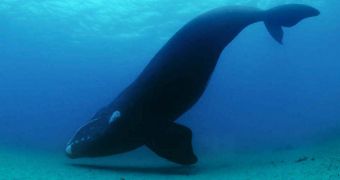According to the findings of a research recently published in the journal Conservation Biology, the right whales living in the Stellwagen Bank sanctuary are now experiencing great troubles when it comes to communicating with one another, all because of human-driven noise pollution.
By monitoring both the sounds produced by whales when trying to 'get in touch' with one another, and the underwater noises resulting from various ships crossing the region over a rather lengthy period of time (2007-2010), marine specialists found that right whales living in the Stellwagen Bank National Marine Sanctuary have experienced a drastic loss in terms of their communication abilities.
To be more precise, their capacity to bounce messages back and forth between themselves was reduced by two thirds.
Therefore, right whales more often than not are kept from efficiently communicating with one another, something which can negatively impact on their group dynamics and therefore on their breeding patterns.
Given the fact that right whales are all endangered species, the results of this study need be given due consideration, especially by those who are in charge of designing and implementing conservation projects aimed at safeguarding these marine mammals.
The official website for the US National Oceanic and Atmospheric Administration quotes Leila Hatch, Ph.D, who explained how, “A good analogy would be a visually impaired person, who relies on hearing to move safely within their community, which is located near a noisy airport.”
In other words, “Large whales, such as right whales, rely on their ability to hear far more than their ability to see. Chronic noise is likely reducing their opportunities to gather and share vital information that helps them find food and mates, navigate, avoid predators and take care of their young.”
For those unaware, the Stellwagen Bank National Marine Sanctuary is an area of about 842-square-mile located at the mouth of the Massachusetts Bay, which is presently under federal protection and serves as a safe haven for numerous marine creatures.
Therefore, any such disturbances in the natural ecosystems here can have significant negative effects on our planet's biodiversity.

 14 DAY TRIAL //
14 DAY TRIAL //